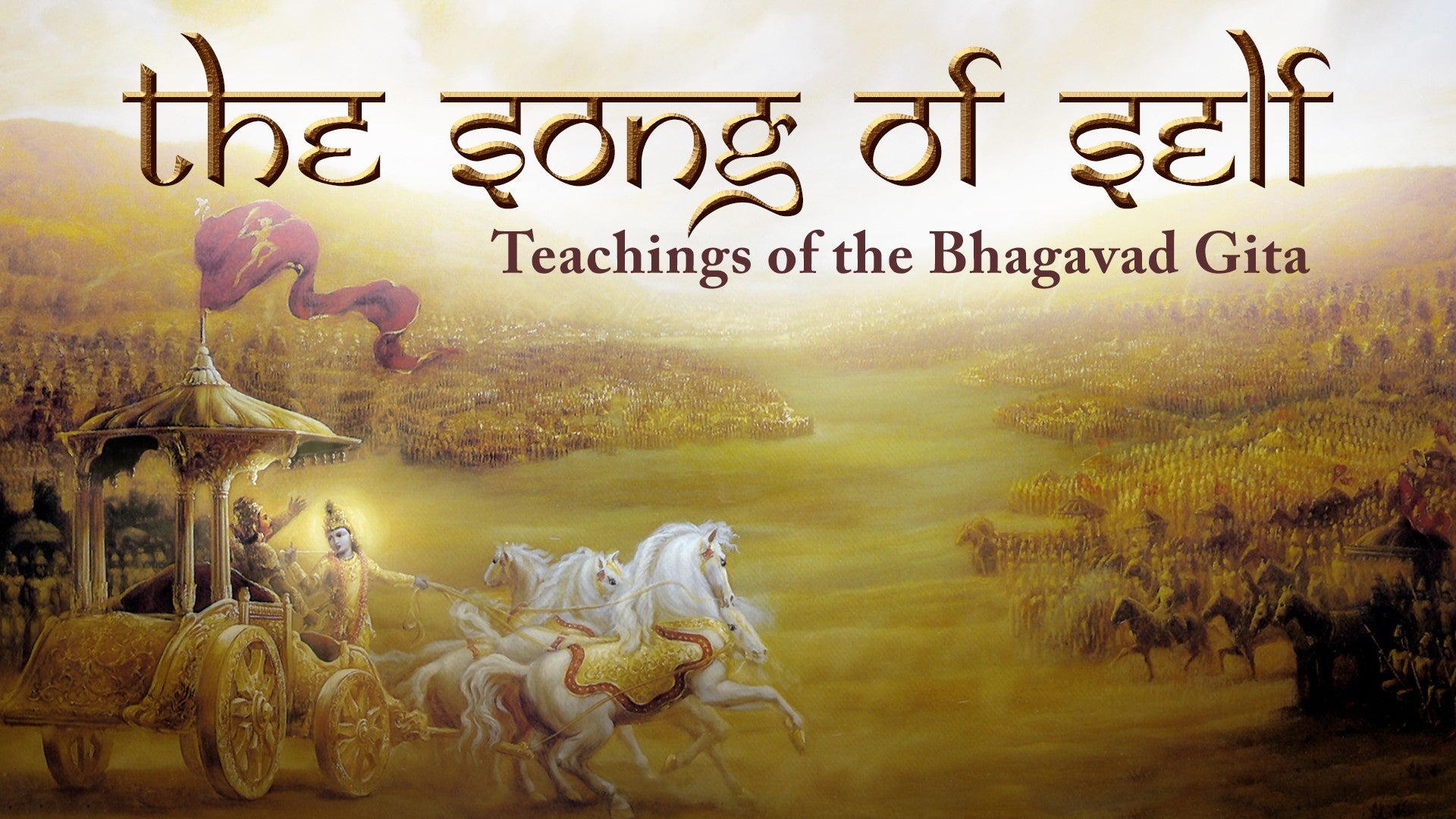Description
About This Video
Transcript
Read Full Transcript
So Krishna's exhorted Arjuna to get up and stand up like the true hero he really is, throwing off this faint-heartedness. But then Arjuna kind of protests. He says, but wait a minute, Krishna, and he explains why he felt so overwhelmed. And Arjuna now speaks for five verses. We're going to look at the first three together now. This is the one he's explaining why he feels so torn, so afflicted. And so he says, Okay.
So with these three verses, Arjuna kind of explains why he feels so overwhelmed. And basically, Arjuna's torn. There he is in the battlefield, and part of him is thinking, I've got to go and fight. But he sees on the opposing army his gurus, and he sees his cousins. And he thinks, if I fight in this war, I'm going to have to fight against my dear teachers, and I'm going to have to fight against these people who I hold dear. And I'll destroy all the families that I dear to me by fighting against these people who are standing opposite me.
And so in the fourth verse, he asks Krishna, he says, Krishna, how can I possibly fight with the very weapons and techniques they taught me against my beloved gurus, Bhishma and Rona? How can I fight against them on the battlefield? And we can sympathize with him, yeah? We would never generally want to use skills or techniques we've learned from somebody dear to us against them. But this seems to be the situation Arjuna finds himself in. And in the fifth verse, he goes on, and he says, Guruna hatva hina mahana bhavan, sreyo bhoktam baiksham api ihalor ke says, here in the world, I would do better to live as a beggar and to fight against my venerable gurus.
If I kill my gurus, even though now they are only acting for their short-term selfish interests, everything that I experience hereafter would be tainted with their blood. So we can sympathize with Arjuna, especially in the Indian context if we consider it for a moment. These are his gurus who he has to fight against. So in the Indian tradition, the guru shisha, the guru-student relationship, is a particularly intense one sometimes, and particularly close one. And it's the idea that generally, how does one behave towards one's guru?
With great reverence and respect, yeah? So you don't generally fire arrows at your guru and try to kill them. If it's an archery guru, you may fire your arrows so they land at the guru's feet and form on the ground a Sanskrit hymn of praise towards the guru. But you don't fire your arrows to kill the guru. And this is what Arjuna is expected to do now.
So he says to Krishna, I'd be better off living as a beggar than fighting against those who were my masters. But something very interesting happens in this verse. Arjuna knows that Krishna is going to say, but your gurus are no longer living up to what they taught you. And Arjuna says, He says, if I kill these gurus who are only acting for their artha and their karma, even then, I won't want to live, because everything I experience will just be smeared with their blood. And I think it's quite easy to sympathize with Arjuna here, but what's really interesting, he says, my gurus now, they're only acting for the sake of artha and karma.
So here we're going to introduce this idea that's quite kind of predominant and very familiar in the Indian tradition of life having four aims. And these aims are artha, karma, dharma and moksha. So moksha means liberation, to become free. And this is the ultimate aim of life, they say. But these other three, artha, karma, dharma, artha, it literally means means.
So your material well-being, having enough food, having shelter, surviving and prospering in the world, this is artha. So everything from having enough to eat to building wealth and prosperity, this is all artha. Karma, you might recognize this word because there's a Sanskrit text that many people in the West heard about when there were still children called the karma sutra. So karma basically means enjoyment. So the idea is not only should we survive, we should also enjoy life.
And then dharma, and this includes the pursuit of the arts, for example. So don't, you don't just have food to eat, food should also be nourishing to all the senses because it's a work of art. This is the idea that when you have really nourishing experiences, you grow and life becomes freer and fuller. And then there's the idea of dharma, which you've already mentioned. Dharma is the action which is sustaining, which is conducive to harmony and well-being all around.
So the idea is that if we're going to become free, moksha, the ultimate aim of life, we actually don't need to worry about that. We don't need to pay much attention to that at all. All we need to do is make our arta and our karma in line with dharma, and then moksha will naturally blossom. This is the idea. So sometimes, you know, people in this practice, I want to be free, and we get carried away with these lofty ideas.
I need to do this practice and that practice and check out from the world. But yoga is not really like that. The idea is that in the world, by living in harmony, then you can be free even amidst it all. But what's happening here is that Arjuna's gurus, Bhishma and Drona, they have basically thrown dharma out the window. They're no longer doing that which is conducive to the well-being of the whole kingdom.
They're siding with Duryodhana, who's become a little bit of a scheming tyrant, who has tricked and duped his cousins out of their rightful share of the kingdom, and who behaved in that terrible way which we heard about earlier in the background. So he's not really ruling for the well-being of all. He's just serving his own short-term ends. And Arjuna's gurus have lined up in the battlefield with Duryodhana. So Arjuna knows that Krishna's going to say to him, your gurus are no longer worthy of being your gurus.
They're just out for their own short-term interests. But Arjuna says, even though they're no longer living up to the standards they taught me, still they are my highly respected gurus. I owe them so much. I learnt so much from them. And so even though now they're not living up to what they taught me, still if I fight against them and slay them, I won't be able to live with that. I'll feel terrible. And I think it's quite easy to sympathise with this.
And Krishna has said, no, get on with it. But what's he really saying? What do the gurus really represent? So the way I think of it is that the gurus, they're things that taught him something that was useful in the past. So by way of illustration, let's imagine that we have a young friend with us. And it can be a young boy. Let's call him Paul.
So we have a young friend called Paul. Paul's three years old. And his father really likes bicycling. And so Paul's father buys young Paul a little bicycle. And they have a living room at home with a nice flat, smooth surface. And Paul is very fond of his little bicycle.
And he rides it up and down the living room in straight lines. Because his bicycle isn't actually a bicycle. Because his father, to encourage Paul, who's still learning to walk, never mind bicycle, to help him balance, he's put those two little extra wheels on, the stabilising trainer wheels. And so it's really a quadricicle. Now Paul, his favourite colour is turquoise blue.
But there were no turquoise blue little bikes available. So Paul's dad bought him a white bike. However, training wheels, the little stabiliser wheels, they were available in turquoise blue. Paul loves his bike. And he particularly likes those bright turquoise training wheels.
And it's his favourite toy. Up and down the living room he rides in straight lines, patiently turning the bike around one way. And the other, having a fine old time. And then he starts to grow a little bit. And Paul's mother and father think, it's probably time for us to take him outside and do that thing that one day we know we have to do, and push him and let him discover what it means to really ride a bicycle.
And so, bedtime, story time, Paul's father's telling him, he says, Paul, tonight I have to tell you is a very special night. Because this evening, the training wheel fairies are going to pass through town. And they're going to take your training wheels away and give them to another little boy who needs them more than you do. And what does Paul say? No, no chance.
He's like, what are you talking about? I love my blue training wheels. You're not having them. And he's very upset. And so Paul's father realizes, okay, maybe it's not the best moment.
We'll wait another month. Another month goes by and again at bedtime. Paul's father says, tonight it's that time of the month again and the training wheel fair is going to be sweeping through our neighborhood. So say goodbye to your training wheels, Paul, the time has come. Now Paul, he's grown a bit.
And now he's a bit stronger. He can actually pick his bike up. And he picks it up and takes it into his bedroom. He says, no way. I love my training wheels.
They've given me so much joy. Why would I want to part from them? I love them. They are my teachers. You told me they're helping me learn to ride.
Leave me alone. And so Paul's father thinks, what to do? And so another few days go by and they discuss this with his wife. He says, okay, yeah, we're just going to have to do it. Once he's asleep, we'll dismantle the training wheels and we'll give them to the neighbors.
And the next morning we'll just have to be patient. And this is what they do. And Paul wakes up and how does Paul feel? Young Paul is outraged. And he kicks off a big fuss.
But then he calms down a bit. It's a nice sunny warm day, not overly hot. And mum and dad take Paul out, out to the park, flat grassy area. And they take the bicycle. And now Paul's dad is holding the back of the seat and walking and then running along as Paul pedals, fasting as ever pedaled before.
Oh, letting go of the training wheels wasn't so bad. And then Paul's dad, it comes to that moment. What does he have to do? He lets go. And then what happens?
Well, I think we all know what happens. Maybe we experienced it ourselves. We have our first fall from the bicycle. However, before Paul falls, even if it's only for a split moment, he experiences something else. It's like he's flying.
And the experience of that joy is strong enough that once he's hit the ground, he's motivated to get back on because he wants more of that sensation of truly bicycling. And then a few hours of practice go by and Paul's happily cycling around without mum or dad holding the seat. A couple of weeks go by and Paul has discovered the joy of cornering. And he's riding around so happily. And then a couple of months go by and he's out on a bicycle ride with mum and dad.
And they see another little boy with bright blue training wheels on his bike. And dad says to Paul, hey, Paul. Hi, see, somebody else is benefiting from them. But you know, we could ask him for them back if you really want. And of course, what does Paul say?
What are you talking about, dad? They're for babies. So this is the idea of the guru that we have sometimes to leave behind or even we might say kill. Now, this is a rather dramatic way of stating it. But it's the idea that that very same thing or person or tendency or habit which can be our great teacher at one stage of life, usually they'll come a moment where it's no longer really serving us.
And so we'll have to leave it behind. And this can be very difficult because we might have developed a very affectionate relationship towards that thing. So for example, when we're a student, let's say, at school, certain ways of behaving and certain patterns of life, they might help us really do well in the school environment. But then when we're older and we have a family or we have various jobs and different professional or societal commitments, if we carry on behaving in the ways that served us really well when we were at school, what might happen? We'll actually block ourselves excelling in the new challenges of life in the way that those old patterns helped us excel in our school days.
And so this is what Arjun is finding himself facing. He's come to that moment where the lessons that he'd relied on up to that point, he's kind of graduating to the next level. They will no longer serve him. But that's hard to let go of that, and that's why he feels so torn. And then he also says, and also Krishna, we don't know who's going to win in this battle, you know?
But we do know, you know, they might win. You know, the crowd of us, our cousins might prevail. But we do know that whoever comes out on top, it's still going to be just a disaster because so many of the people who are dear to me will be destroyed. If I win and I conquer them, I want to live because I'll have, you know, destroyed the families of so many people dear to me. How can I possibly cope with that?
How can I possibly fight against them, Krishna? And again, it's very easy to sympathise with Arjuna. But what's really going on here? So the crowd of us, they represent those tendencies within that are based on our previous experience. Whereas the part of us, they are those noble instincts that are driving us forwards into new realms of experience, into new ways of being.
So Arjuna's saying, how can I possibly kill my old familiar habits? They've been with me faithfully all these years because the cousins, they all grew up together. They all know the same territory. But really, it's similar to the Gurus. They're familiar, but now they're behaving in a way which is actually contrary to the sustained well-being of the whole.
So sometimes in life, we have habits, habits that we know we might not really want to continue, and yet they've been such a comfort and support and maybe even a great help to us over the years. Let's say, for example, we identify a habit or a way of behaving that is no longer serving us. And we decide, okay, I'm going to leave that behind now. What does that habit do? Does it say, well, thanks for having me all these years, so long, and I'll be off now?
Generally, when the habit has been identified as something that's no longer wanted, it tries to persuade us, wait a minute, you know, think of all those tough times, you know, I'm always there for you. You think, yeah, yeah, but that was then, and this is now, so off you go. And you think you're free of that old habit, but then let's say what happens. A tough situation arises, and then the mind says, oh, but how can you throw that out? Why do you go back to that old habit that can always comfort you in times of need?
And so this is what Arjun is experiencing. It's like there's these old ways, these things that have been part of what's brought him to this place now, and maybe they were perfect for him before. Maybe they were wonderfully supportive, but now they're no longer serving him. And so we get reminded of this many times in the yoga teachings. Sometimes we might be working with a particular technique, a particular practice modality, as we explore yoga and cultivate that integration.
We may start off, let's say, with an Arthuna type of practice or a particular meditation technique, and we may find it serves us beautifully, and we feel, oh, yeah, I can really rely on this. And let's say, for example, we're doing a particular type of practice, and we find our way through a tough situation in life. We might think, oh, it's that practice, it's that technique, it's that particular sequence, it's doing the practice at that particular time of day that helped me through. But really, it was the greater presence that the technique was inviting, which saw us through. So sometimes, as life throws up new challenges, new approaches are actually required.
If we think of life as a great journey across land and sea, when we're on the sea, our boat is our best friend. When we get to the land, if we try and take our boat with us, we won't be able to discover these vast plains and beautiful hills in front of us. If we're going to climb the mountain, the boat is just going to stop us. Similarly, we might, for example, cross a bridge. If we're in the mountains, and there's a big canyon, for example, and when we cross in the bridge, the bridge is just our best friend.
But if we try and then put the bridge in our back to continue our way, we're just going to actually stop ourselves. And so this is where Arjuna finds himself here. The mechanisms, the ways of being, on which he's relied up to now, they're not quite inclusive enough. And so he has to do the work of destroying, of de-structuring the structures that he has relied on up to that point. And this is challenging work.
It tears us apart, and so it can feel overwhelming. And Arjuna certainly feels overwhelmed. And so he goes on to explain to Krishna, having kind of said, why he feels so terrible, and now something very significant happens.
The Song of Self: Bhagavad Gita: Chapter 2
Comments
You need to be a subscriber to post a comment.
Please Log In or Create an Account to start your free trial.














